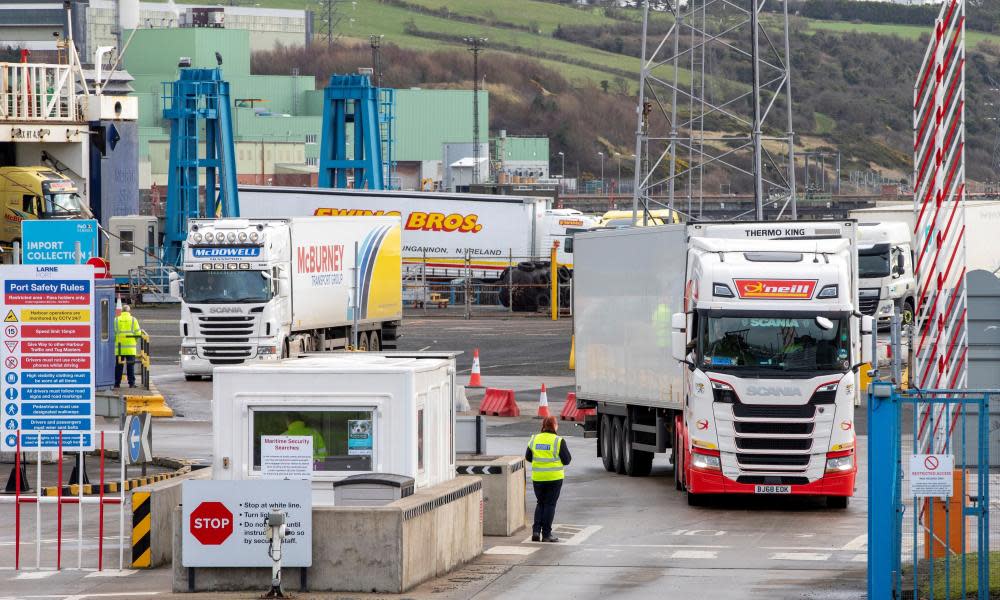Brexit Northern Ireland protocol is lawful, supreme court rules

The Northern Ireland protocol is lawful, the supreme court has ruled, rejecting a legal challenge to the Brexit arrangements by a group of unionist leaders including the former first ministers the late David Trimble and Arlene Foster.
Five law lords presiding in the highest court in the UK unanimously dismissed the appeal on all three grounds including the claims that the Brexit trading arrangements breached the 1800 Act of Union and the Northern Ireland Act 1998.
Handing down the judgment in the supreme court, Lord Justice Stephens noted the seven appellants had contended that the protocol had “brought about a substantial diminution to the status of Northern Ireland within the UK” but ruled that the protocol did not breach previous laws, as contended.
Related: What is the Northern Ireland protocol and why is it back in the news?
The Democratic Unionist party leader, Jeffrey Donaldson, said a solution to the protocol, which his party opposes, “was never going to be found in the courts” but maintained the Brexit trading arrangements remained “an existential threat to the future of Northern Ireland’s place within the union”.
He added that “the cases have served to highlight some of the reasons why unionists have uniformly rejected the protocol”, urging the government to consider the arguments made by the appellants.
The ruling is a setback for the DUP, which has argued that the constitutional position of Northern Ireland in the UK has been weakened by the protocol, which obliges the region to observe EU trade laws while the rest of the UK does not.
The SDLP Northern Ireland assembly leader, Matthew O’Toole, said he understood the “disappointment” the appellants would feel about the ruling but it provided “important clarity” on the law at a time when the UK and the EU were negotiating a new settlement on the protocol.
In its assessment of the first ground of appeal, the judges said the appellants’ arguments as to whether the 1800 Act of Union and more recent acts enabling the UK’s withdrawal from the EU were statutes of a constitutional character were “academic”.
Even if they were, the “clearly expressed will of parliament” could not be overridden, they said.
“The most fundamental rule of UK constitutional law is that parliament, or more precisely the crown in parliament, is sovereign and that legislation enacted by parliament is supreme,” they said in their ruling.
The judges cited a 2019 supreme court case brought by Gina Miller to determine its ruling on the second ground of appeal, that the protocol was incompatible with the 1998 Northern Ireland Act.
In that case, the judges had ruled unanimously that the 1998 act did not regulate any change in the constitutional status of Northern Ireland, other than the right of the people to decide, by referendum, if they wanted to remain in the UK in a new united Ireland.
They dismissed that ground of appeal as an “incorrect” meaning of the 1998 act.
Thirdly, the judges also rejected arguments that the protocol could only be enforceable if it had cross-community support, noting a post-Brexit provision in the 1998 Northern Ireland Act giving the Northern Ireland assembly a chance to vote on whether articles 5 to 10 of the protocol should continue to apply.
The challenge, in two separate cases considered jointly by the judges, was made by a group of unionist and loyalist leaders and activists that also included the former Labour cabinet minister Kate Hoey, the Traditional Unionist Voice leader Jim Allister, the former Ulster Unionist party leader Steve Aiken, along with the former Brexit party MEP Ben Habib, and the former loyalist prisoner and recent master’s in law graduate Clifford Peeples.
They also argued that it had breached the principle of consent at the core of the 1998 Belfast Good Friday agreement.
They lost their case in the Belfast high court in June 2021, with the presiding judge Mr Justice Colton concluding that the Withdrawal Agreement Act containing the protocol did conflict with the guarantees of equal treatment contained in the Act of Union.
However, he said the later parliamentary legislation sealing the UK’s exit from the EU “impliedly repealed” the 1800 laws, something that was possible with another “constitutional law”.
Allister had said the ruling “confirmed the protocol is dismantling the union”.
The appellants had also argued that the protocol unlawfully eliminated the constitutional safeguard enshrined in section 42 of the Northern Ireland Act 1998, which requires assembly votes to have cross-community support. Finally, the appellants alleged that there had been a breach of the European convention on human rights and EU law.

 Yahoo Movies
Yahoo Movies 
